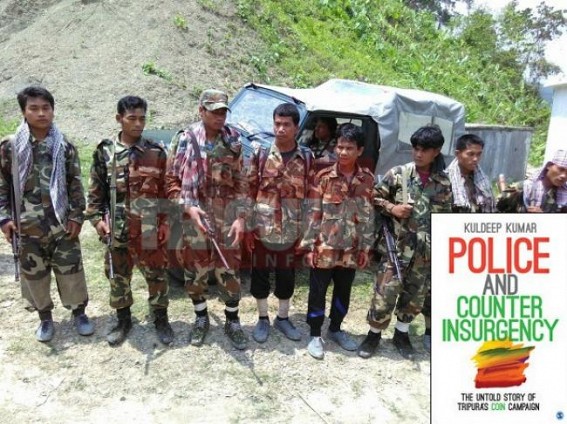Subir Bhaumik

PHOTO : TIWN File Photo : Surrendered NLFT rebels in Tripura, April '2016
Kuldeep Kumar has done a wonderful job to tell the world how tiny Tripura tackled a violent insurgency with its own police force taking the lead to turn the bull by its horns.
Tripura is the fourth success story of police in Indian counter-insurgency operation -- West Bengal, Punjab and Andhra Pradesh being the other three. But Tripura's success does not carry the huge stink of massive human rights violation that is associated with Punjab and Andhra Pradesh.
Usually in post-colonial India , failure of state police to counter insurgencies have led to wholesale breakdown of law and order in face of escalating insurgent violence and that has been followed by deployment of para-military and army units . It is usually presumed that the army is better trained , has superior hardware, intelligence gathering , training and discipline to handle the rebellions.
But in Tripura, the police demonstrated under leadership of four successive DGs - Vohra, Srivastsava, Sahay and Saleem Ali -- that it could overcome its inherent disadvantages and fight back effectively leveraging its local knowledge of terrain, people and neighborhood.
All will agree with Kumar when he says that "Tripura's campaign also confirms that investing in building local police capacities is an extremely efficient , reliable and economical way of dealing with insurgent violence." Since in India, no state can be sure of having a sufficient quantam of federal forces for as long as it wants them, it serves all states afflicited with insurgency to develop and modernise their own police forces.
Both the army and the police are not inherently trained for counter insurgency. The army is trained for conventional warfare against a foreign enemy , the police to maintain law and order and investigate crime. Counter-insurgency is something they have to get into under pressure of circumctances.
So if the army can develop CI capabilities, why not the police, During both his longish tenures in Tripura police, Kuldeep Kumar commanded the Tripura State Rifles, that has now emerged as India's one of the finest counter-insurgency forces . So the way the TSR was turned from a tatterdemalion force into a regiment of heroes is well described by Kumar.
Kumar also rightly stresses the role of the political executive in handling the counter-insurgency operations . This is crucial. So long CM Manik Sarkar and his party stuck to the Nripen Chakrabarty's line of seeking political settlements with the insurgents , nothing worked and it all got worse. It is thus important to note that the party and government's decision to hit back with a no-holds barred approach holds the key to Tripura COIN (counter-insugency) success.
This is a must read book for all interested in counter-insurgency. It however does not tell the whole story of counter-insyurgency success of Tripura.
What Kumar totally misses out -- and perhaps because he was neverprivy to such operations being in TSR -- is the hostile covert operations of the Tripura government inside Bangladesh territory using surrendered militants and Bangladeshi mafialords.
My book " Agartala Doctrine: proactive Northeast in Indian Foreign Policy " (OUP) details those covert operations because I was privy to those being part of the 'informal operations team' put together by DG G M Srivastava. Here was a cl;assic case of Military Intelliugence and BSG collaborating with State police to prepare groups of surrendered militantsto raid rebel bases inside Bangladesh, run massive disinformation camapiagns to fuel factional feuds between rebel groups and sometimes use Bangladesh mafia to hit targets as far as Dhaka.
But the revelations in my book does not contradict the key findings so nicely put together by Kumar. It substantiates our corecontention -- there is no substitute to self reliance meaning no alternative but to develop the COIN capability of the state police.
Globally, the role of local police has been receiving increased attention following conflicts in Iraq and Afghanistan. The criminalization of insurgent networks coupled with the growing nexus of warlords and drug lords and porous borders in many conflict areas have also bolstered the case for good policing.
Kumar's book makes a case for the increased role of local/state police in counterinsurgency (COIN) operations by citing the successful implementation of this strategy in the state of Tripura , in which the author played a role himself.
This makes Tripura the only state after Punjab and Andhra Pradesh ( strangely Kumar misses out West Bengal police successin handling Naxalite rebellion in 1970s) where the police have taken full control of such operations. The work combines rigorous scholarship and research on general policing and COIN operations with incisive analysis of multiple insurgencies/terrorist movements in India.
 To send your appreciation and comments pl. send email to editor@tripurainfoway.com or tripurainfoway@gmail.com or post online below.
To send your appreciation and comments pl. send email to editor@tripurainfoway.com or tripurainfoway@gmail.com or post online below.- Why Modi’s BJP swept key India regional elections
- TIWN’s landmark legal victory against BJP Govt’s Illegal attacks to shutdown fearless Media
- India to be world's third-largest economy by 2030 -S&P Global Ratings
- Tripura's Dark Era : Mafia style Brutal attacks on Journalists, fight for your Citizen rights !
- How to access tripurainfoway.com via HOLA from India



